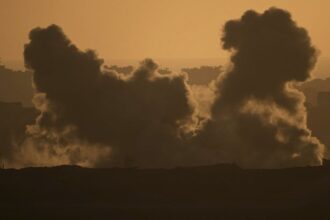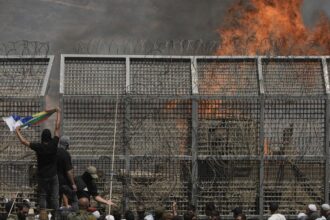In a dramatic escalation of cross-border tensions, Ukrainian forces reportedly launched a drone attack on a Russian nuclear power plant early Thursday morning, coinciding with the 38th anniversary of the Chernobyl disaster. Russian officials claim the attack targeted the Kursk Nuclear Power Plant, located approximately 100 kilometers from the Ukrainian border, raising serious concerns about nuclear safety in the region.
The Russian Defense Ministry issued a statement confirming they had intercepted and destroyed all approaching drones before any critical infrastructure could be damaged. “The attempt to strike the nuclear facility was thwarted by our air defense systems,” said Colonel Ivan Petrov, spokesperson for the defense ministry. “This reckless action could have led to catastrophic consequences reminiscent of Chernobyl.”
The timing of the alleged attack carries particular significance, occurring exactly 38 years after the devastating 1986 Chernobyl nuclear disaster that contaminated vast areas of Ukraine, Belarus, and Russia. That historical tragedy continues to serve as a sobering reminder of the dangers posed by nuclear accidents.
Ukrainian officials have not confirmed responsibility for the attack, with military spokesperson Oleksandr Kovalenko stating only that “Ukraine reserves the right to neutralize military threats using all available means.” Independent verification of the incident remains difficult, as access to the area is restricted for international observers and journalists.
The International Atomic Energy Agency (IAEA) expressed immediate concern, with Director General Rafael Grossi calling for “maximum restraint” from all parties. “Any military action directed at or near nuclear facilities carries unacceptable risks,” Grossi stated. “We are monitoring the situation closely and have requested access to inspect the facility.”
This incident follows a pattern of increasing drone warfare between the two nations, with both sides regularly targeting energy infrastructure. However, an attack on a nuclear facility represents a significant and dangerous new development in the ongoing conflict that began with Russia’s full-scale invasion in February 2022.
Energy security experts warn that even unsuccessful attacks on nuclear facilities can have serious implications. “The psychological impact alone creates instability in the region,” notes Dr. Elena Petrova, nuclear security analyst at the Toronto Institute for Global Affairs. “Even if physical damage is prevented, these actions increase the risk of human error during heightened alert situations.”
The alleged attack has prompted renewed diplomatic efforts, with several European leaders calling for immediate de-escalation. The United Nations Security Council has scheduled an emergency session to address the incident and its implications for international security and nuclear safety protocols.
As tensions continue to mount between Russia and Ukraine, the international community faces difficult questions about how to prevent military actions from threatening nuclear safety. What safeguards must be strengthened to ensure that the ongoing conflict doesn’t inadvertently trigger a nuclear disaster that would dwarf even the humanitarian crises we’ve already witnessed?










